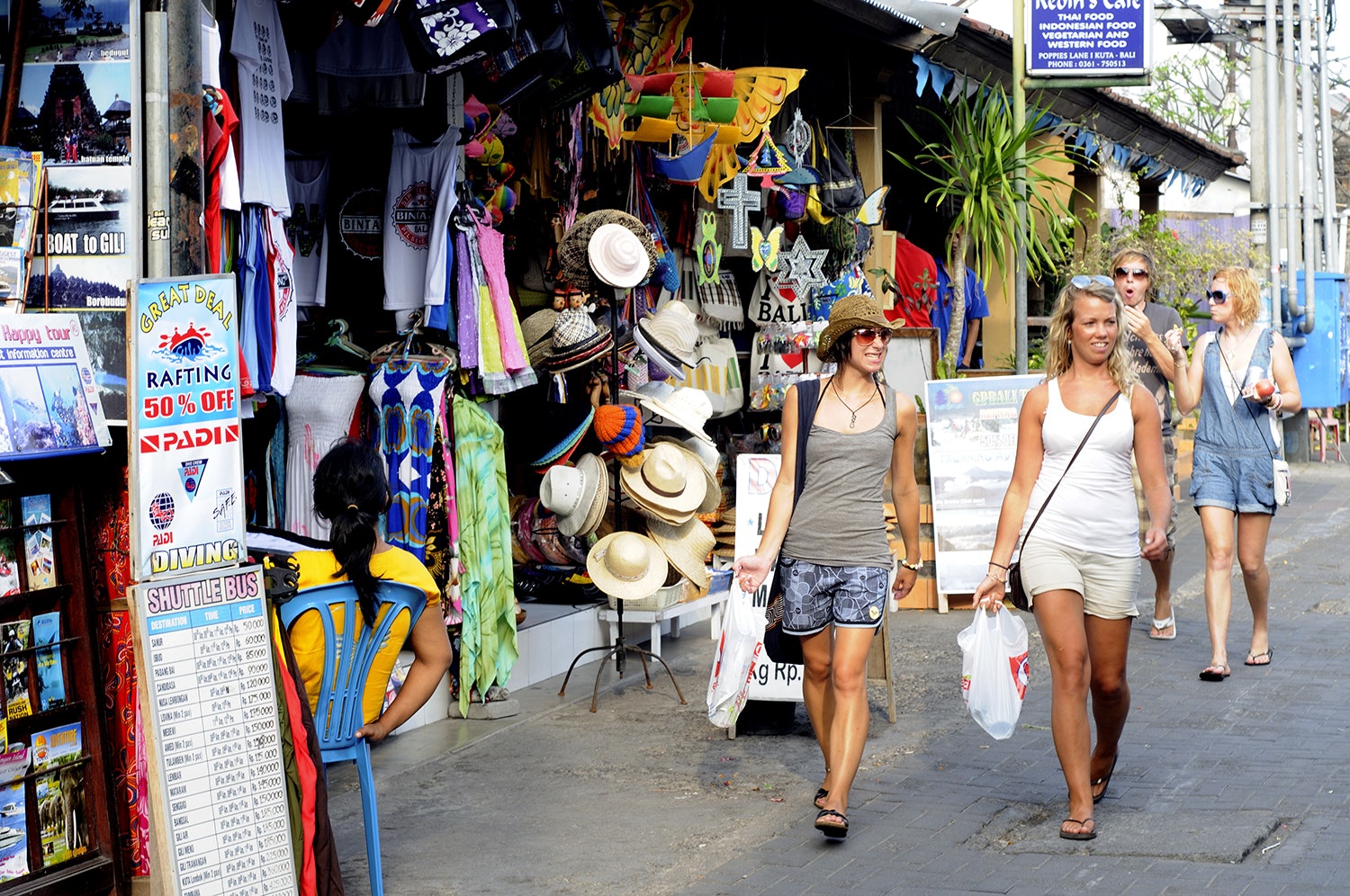

Bali's shopping is legendary. Not only are visitors spoiled for choice by the variety of goods on offer, there's also a rich array of shopping venues and styles. From sorting through hand-painted batiks at a local market to purring over designer duds in air-conditioned malls, shopaholics are sure to find their fix in Bali. We’ve put together a round-up of the best shopping the island has to offer.

Endless surf wear
Back in the days before indulgent dining, hip hotels and world-class day spas, Bali was a destination reserved for intrepid travellers, most of whom came toting a surfboard. These days, surf shops still persevere with their simple living ethos, while big brand stores like Rip Curl and Billabong now compete against a new army of boutiques offering grassroots brands and a next-level customer experience. Check out Drifter in Seminyak, a Sumatra bean brewing coffee shop set among designer surf gear in a salute to an endless summer; Single Fin, known for its ultimate Sunday session at their Blue Point, Ulu Watu store. Also check out Deus Ex Machina (deuscustoms.com), a grungy surf/skate brand that designs much of its gear – including snug vintage-inspired trunks and wooden longboards – in a 100-year-old Javanese-style house in Canggu where customers can skate, eat, purchase a custom motorcycle and listen to live music. You’ve been warned: buying surf wear in Bali means a whole lot more than shopping.

Home decor and furniture
Chiseled chairs, tribal rugs, canvas art, antique urns – furniture shopping in Bali is all about statement pieces and classic design. Big spenders can splash out in the comfort of stores like Saya Gallery (sayagallery.com) and treasure hunters might find themselves gawking over glossy Ming Dynasty ceramics at Kharisma Antiques (kharismabali.com). In Ubud itself, collectors may be inclined to pick up some Chinese bamboo bedding at BambooKu (bambooku.com) or a traditional stone carving at Kuluk Gallery (kulukgallery.com). Oh yes, an entire trip to Bali could be dedicated to the art of furniture shopping.

Designer shopping in South Bali
So Bali’s notorious phallic bottle-openers and faux watches don’t tickle your fancy? Never fear, Seminyak will have you weighed down by bags of designer duds and forgetting those cheap sarongs in no time. Many of Australia’s most sought-after designers create their magic in Bali and have stores on the island to boot. Scour flamboyant prints by Mister Zimi, playful dresses by Alice McCall and boho bits by Auguste Frank. But it’s not just Australian designers who have set up shop here: you'll also peruse racks of delicate fabrics by French designer Magali Pascal, sparkling show-stoppers by Brazilian brand Uma and Leopold, and zany gear by This is a Love Song. Still not satisfied? Perhaps the Gucci store at DFS Galleria in Kuta (dfs.com/en/tgalleria-bali) or the Bvlgari Boutique at the Bulgari Resort (bulgarihotels.com) on the Bukit Peninsula will have what you’re looking for.

All things eco
In what might be considered a revolt against the island’s less-than-admirable environmental habits, Bali is becoming a major hub for sustainable and ethically conscious consumerism. Natural dyes, fabrics crafted with a conscience, and community-centric production methods are just some of the hallmarks of the island's eco-aware products. Look out for brands like Ono Creations (onocreations.com), with its ethical, leather-soft bags made from sustainably sourced fibres like cork oak; Smile Clothing (smileclothing.co), which has a one-for-one donation policy; and Threads of Life, which produces exquisitely detailed textiles in the name of alleviating poverty and preserving culture.
Local exports
From the unimaginably delicate Uluwatu lace to kopi luwak coffee, brewed with seeds defecated by the Asian palm civet, Bali offers plenty of home-grown products. Take a day trip to Ubud’s Teba Sari (tebasari.com) plantation to buy coffee beans, aromatherapy products and local herbs and spices. In east Bali, embrace your inner child at Charlys Chocolate Factory (charlyschocolate.com), a cacao farm that produces organic almond milk chocolate and handmade soaps.
For those looking for a more immersive shopping experience, sign up for a batik painting class (check balispirit.com for class schedules) and go home with a sarong you've painted yourself. Immersive consumer experiences like this one are keeping traditions alive and helping to support local communities.

Tourist trinkets and market finds
A trip to Bali wouldn’t be complete without a good-humoured bartering session over a sarong (or five), a few pairs of bargain sunglasses, a risqué T-shirt, and countless mentions of good luck and ‘special morning prices’. Even if you think you’re above the bintang-emblazoned apparel, a trip to the local market stands can still prove fruitful with tie-dye kimonos, crochet slips and good quality shoes selling for the price of a mie goreng at a good warung (food stall).
Bali shopping tips
Carefully consider the pros and cons of shipping goods home before making your investment. Although reputable shipping services do exist, duties and taxes along with lengthy delays can make the whole exercise more trouble than it’s worth. Then there’s the possibility of your beloved purchases not clearing customs on the other side.
Check your home country’s customs and import regulations before making any big purchases. Even items as seemingly innocent as cosmetics and ceramics fall onto contraband lists, as do animal products including furs.
Remember that bartering is not accepted everywhere, particularly not in malls and boutiques. Politely ask, and if it is acceptable, stay jovial while trying to score a great deal – no one likes a scrooge with a bad attitude.
Get your shopping done in the morning or late afternoon. Trying on clothes after battling the peak of the Bali sun is no fun.
If you’re getting items made to order, allow plenty of time for a few rounds of alterations and only pay a small initial deposit until you are completely happy with the result.
Much of the apparel made in Bali cannot be machine-washed. Read the label carefully, and if there’s no label, don’t risk it. Even machine-washable items should be washed separately the first few times.















